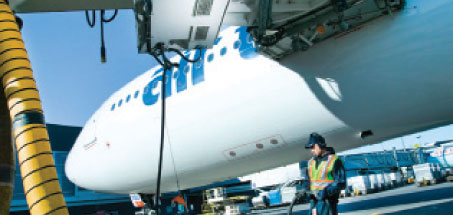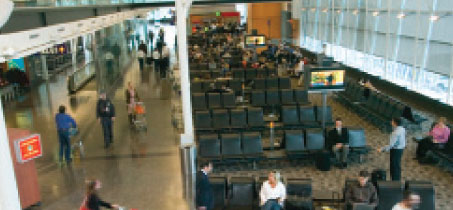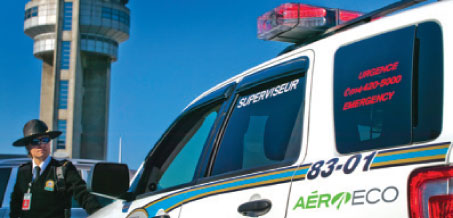
Cherry: “In today’s challenging business market, judicious choices for new facilities, processes and equipment are not only important for the environment, but can bring lower maintenance and running costs in the long-term.”
Climate change has brought global airports under increasing scrutiny, even though, according to Airports Council International (ACI), they account for only a small fraction of the 2% of total CO2 emissions attributable to the aviation industry. “We’re concerned because we’re community based, highly visible, public and accessible, whereas airlines operate at 36,000 feet,” said James Cherry, president and CEO of airport authority Aéroports de Montréal (ADM) and past chairman of ACI WORLD.
Airports also face a wider range of environmental challenges than other industry players. These are sometimes neglected in the climate change debate, which focuses on the industry’s carbon footprint. They include noise levels around the airport, airport energy efficiency, local air quality, ground and surface water and soil quality, recycling and sustainability, and habitat and wildlife management.
ADM, which manages Montréal-Trudeau and Montréal-Mirabel airports, has taken a proactive stance in terms of mitigating the impact of its operations on the environment, recognising that this is a business imperative. “Good environmental stewardship is a centrepiece of our operating and development strategies,” noted Cherry. “In today’s challenging business market, judicious choices for new facilities, processes and equipment are not only important for the environment, but can bring lower maintenance and running costs in the long-term.”
ADM is one of the few airport administrations in North America with an environment management system that is certified ISO 14001. It is also a signatory of the Declaration of Commitment to Action on Climate Change, in which the aviation industry has pledged to work to achieve zero carbon emissions growth and, eventually, a carbon-neutral future.

ADM has launched an innovative project with Montréal’s Concordia University to manage natural light with automated shades in airport jetties to reduce the need for heating and air-conditioning.
The airport authority has many environmental achievements under its belt, and is constantly seeking further improvements. For example, the main terminal of Montréal–Trudeau airport has received BOMA BESt (formerly Go Green Plus) certification. This is awarded by the Building Owners and Managers Association to acknowledge efforts made to improve the environmental performance of commercial buildings, including energy efficiency measures.
Energy consumption halved

ADM is participating in projects to plant trees and restore the monarch butterfly habitat in a bid to enhance the ecological heritage of the Montréal region.
ADM has made major technical improvements to its heating, ventilation and air conditioning (HVAC) system to optimise its performance and supply energy based on demand. As a result, Montréal-Trudeau’s average annual energy consumption has been reduced by more than half despite a doubling of the size of the terminal since 2000.
The airport’s thermal plant, commissioned in 2003, is another energy efficiency showcase, achieving a 70% energy efficiency improvement. ADM has also reduced fossil fuels required to heat the airport complex by installing a new electric boiler. Moreover, it has achieved added energy efficiencies through the installation of variable speed drives on escalators, the use of heat-reclaim type chillers, the construction of an underground parking garage heated by low-temperature hot water, and the installation of water recycling humidifiers.
To help reduce greenhouse gas emissions, ADM has enhanced de-icing and snow removal procedures to reduce aircraft on ground or circling in the air, introduced hybrid vehicles and launched a project to use hydrogen as fuel for various types of ground equipment. “We are converting a fleet of 20 vehicles to propane gas under an agreement with Budget Propane,” Cherry said. “A filling station will also be built.” Current data show that propane vehicles emit 25% less greenhouse gases and cost about 35% less to operate.
Innovative shades
ADM has launched an innovative project with Montréal’s Concordia University to manage natural light with automated shades in airport jetties to reduce the need for heating and air-conditioning. “These ‘smart’ shades go up and down automatically as the sun moves through the sky and daylight conditions change,” explained Cherry. “This means less glare and increased visual comfort for travellers and airport staff.” The system – the only one of its kind in the world – uses advanced electromechanical management technology and sophisticated light sensors.

Cherry: “Good environmental stewardship is a centrepiece of our operating and development strategies.”
ADM’s strict environmental policy requires it to develop its properties in harmony with the surrounding natural habitat. For example, it has made a commitment to set aside a 26-hectare parcel of land at the northern extremity of Montréal-Trudeau airport for the creation of a conservation park.
“It’s a magnificent piece of land that is home to a beaver colony,” said Cherry. The airport authority is also participating in projects to plant trees and restore the monarch butterfly habitat in a bid to enhance the ecological heritage of the Montréal region. Furthermore, a wildlife control plan has significantly reduced the number of wildlife strikes on its territory.
ADM’s concern for the environment extends to the disposal of waste materials and recycling. “All waste material from recent construction projects has been carefully separated and sent to dedicated recycling centres,” Cherry explained. “We have also put special effort into controlling liquids and products used to de-ice runways and aircraft.”
While ADM has made good progress, according to Cherry, it recognises that fostering sustainable development will be an ongoing journey requiring cooperation from all industry players. He said: “We intend to share best practices with other industry partners and continue to find innovative and proactive solutions.”







